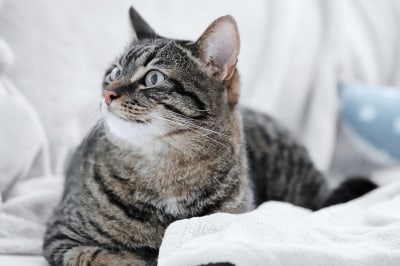Cats need vaccinations to help them stay healthy throughout their lives. In this blog, our Oklahoma City vets explain why vaccinations are important for our feline friends and talk about the cat and kitten vaccination schedule.
Getting Your Cat Vaccinated
Vaccination is essential for protecting your kitten from a variety of serious feline-specific diseases. Following your kitten's first vaccinations, it's critical to give them routine booster shots.
Booster shots 'boost' your cat's immunity to a variety of feline diseases as the first vaccine's effectiveness wears off. Cats receive different booster shots based on their schedules. Your veterinarian will advise you on when your cat should get their booster shots.
Vaccines For Cats
There are two main types of cat vaccinations.
Core vaccinations are recommended for all cats. These vaccinations are considered essential for protecting your kitty from common and serious feline illnesses and conditions, such as:
- Rabies
- Feline herpesvirus type I (FHV, FHV-1)
- Feline calicivirus (FCV)
- Panleukopenia (feline distemper)
Non-core vaccinations are advisable for some cats depending on their lifestyle. Your vet will let you know which non-core vaccines they suggest for your feline friend. Non-core vaccines can protect your kitty from:
- Feline immunodeficiency virus (FIV)
- Chlamydophila felis
- Bordetella
- Feline leukemia virus (FeLV)
When Kittens Should Get Their First Shots
When your kitten is about six to eight weeks old, take them to the vet for their first round of vaccinations. Following that, your kitten should receive a series of vaccinations every three to four weeks until they are approximately 16 weeks old.
Are kittens safe after their first round of shots?
Your kitten will not be fully vaccinated until they have received all of their injections (around 12-16 weeks of age). After receiving all of their initial vaccinations, your kitten will be protected against the diseases that the vaccines cover.
If you want to let your pet outside before they are fully vaccinated, we recommend limiting their exposure to low-risk areas (such as your own backyard).
When Cats Should Get Their Booster Shots
Your vet will suggest bringing your adult cat in for their booster shots either once a year or once every three years, depending on the specific vaccine and your cat's individual needs.
Why Indoors Cats Should be Vaccinated
You may not believe your indoor cat needs to be vaccinated, but most states require rabies vaccinations for cats over the age of six months. When your cat is vaccinated, your veterinarian will issue you a certificate of vaccination, which you should keep in a safe place.
When it comes to your cat's health, it's always best to be cautious. Cats can be curious creatures. Our veterinarians recommend core vaccinations for all indoor cats to protect them from any diseases they may contract if they escape the safety of their home. Indoor cats typically follow the same vaccination schedule as other cats.
Note: The advice provided in this post is intended for informational purposes and does not constitute medical advice regarding pets. For an accurate diagnosis of your pet's condition, please make an appointment with your vet.



